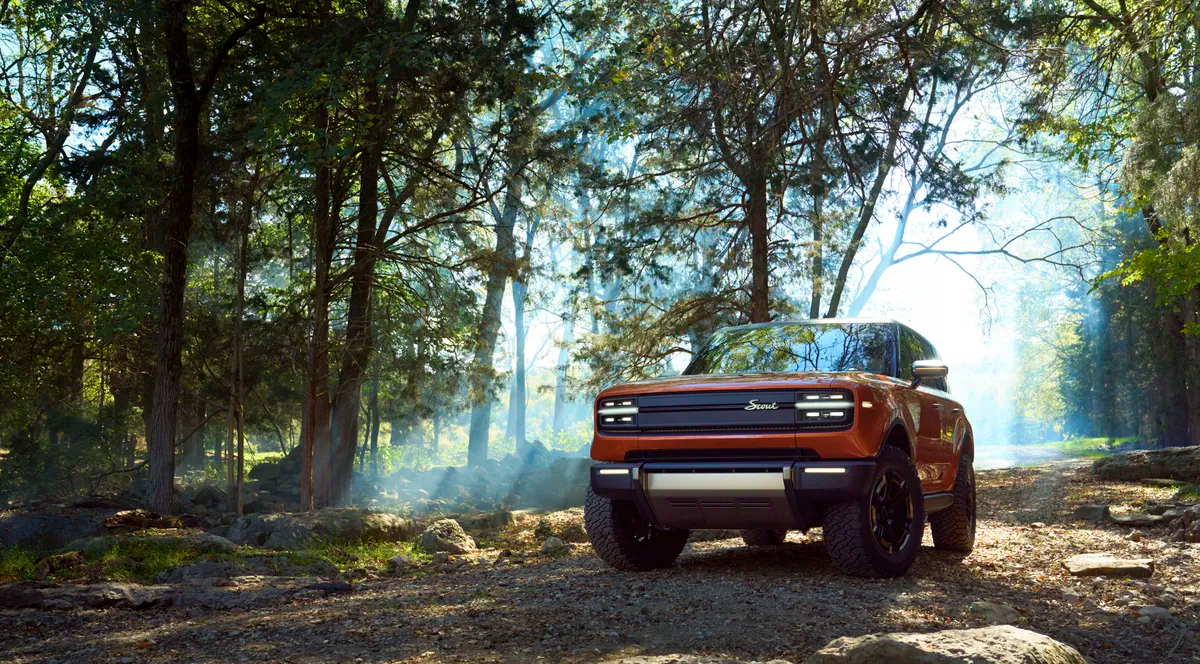
Sign up for daily news updates from CleanTechnica on email. Or follow us on Google News!
The new Scout brand from Volkswagen Group is setting off alarm bells at Volkswagen dealers in America. That’s because the brand intends to cut them out of the sales process completely and offer customers a 100% online direct sales model. To make that happen, Scout Motors will rely on a digital platform that it is building in-house. “Scout Motors doesn’t have any legacy apparatus,” Cody Thacker, Scout’s VP of growth, told The Verge recently. “We kept asking ourselves, if an OEM could start over again, what would they do differently?”
CleanTechnica readers may be skeptical of that claim, given Volkswagen’s travails with getting the software in its electric cars to work properly. Recently, the company forged a $5.8 billion partnership with Rivian to tap the American company’s software capabilities. In China, it is paying Xpeng to perform a similar service. Does that bode well for Scout being able to create a sophisticated digital sales platform? The jury is still out on that question.
Not surprisingly, Volkswagen dealers in America are incensed. For years, they have been begging the company to give them a pickup truck to sell. Volkswagen does sell pickup trucks in other markets, but they tend to be midsized offerings, not the behemoths that Americans prefer. The Scout Terra will be a full size pickup truck that can compete head to head with the Ford F-150, Chevy Silverado, and Ram 1500. “This goes right into where 40% of the profit pools are in the US,” Keogh told Bloomberg. “And these are the biggest single profit pools in the total global car market.” Many companies have tried to do precisely that with only limited success.
On the other hand, auto dealers are decidedly cool to the idea of selling electric vehicles at all. In an open letter to the Biden administration last year, they argued “Americans aren’t ready for EVs” and claimed that electric cars were just sitting on their lots even though a study by the Sierra Club showed 66% of dealers have no EVs at all on their lots. You can’t sell from an empty wagon, people! That is Sales 101.
Customers Loathe Dealers
The Verge says buying a car is one of the most loathed financial transactions for Americans. According to research done by Scout, the car buying experience consumes an average of 13 hours, 31 minutes per shopper. Just 8% of consumers have high or very high trust in dealers, resulting in more than 180,000 complaints about dealers to the Federal Trade Commission every year. Nearly 70% of customers prefer independent service shops over dealer service departments because of issues like overcharging and delays. Add in that 49% of dealers are “not excited at all” to sell EVs and Scout thinks it makes sense to smooth out the car buying experience.
“A big point of frustration for consumers is that they want transparency in pricing and they resent all the hidden fees and markups. Only through a direct-to-consumer model can we tackle these head on and resolve them,” Thacker said. Scout envisions its sales platform as a place where customers can do all the things they would normally do at a dealership, like purchase accessories, set up service appointments, or get details about over the air updates. But instead of chatting with a human dealer, they may instead encounter an AI-powered chatbot. Scout says that it will launch 25 brick and mortar “Scout Workshops” and “Scout Studios” around the country in the next five years where consumers can test drive and learn about Scout vehicles.

The artist renderings Scout has presented of the workshops all show slick looking, airy spaces with open work bays that allow customers to sit and sip coffee while overseeing the work being done on their cars. In addition to the brick-and-mortar locations, Scout will also offer consumers who live more than 45 minutes away from a Scout Workshop the option to book mobile service through Scout-certified partners. Scout will also have Scout Studios, which will act as marketing and sales locations in various locations around the country.
It’s All About The Data
While that is wonderful news for potential Scout buyers, there is more to the direct sales model than just making customers happy. Scout also wants to control customer data more closely, which will allow it to target sales in certain areas, control vehicle supplies, and adjust incentives to keep the company profitable. This is not so much a copy of the Tesla sales model as it is a copy of the Amazon sales model. “Only through a direct sales model can Scout Motors get a full 360 degree view of the customer,” Thacker said. “This means that we can completely influence the customer journey. We can have unprecedented access to customer data, which drives deep customer insights, which can then drive intelligence throughout the business.” Dealerships currently manage most of the customer data and relationships, including financing, in the current model.
Scout spokesperson Lindsay Bago told The Verge, “Just as utilizing franchised dealers may be appropriate for some brands and their customers, utilizing a direct sales model best supports our customers and our strategic customer first vision as we launch a new vehicle platform, a new production center, and a new retail network.” Scott Keogh, who used to be the head of Volkswagen of America, is confident the direct sales model will work and support the consumer in the right way. “Scout wants to be old school,” he told The Verge. “We want a brand that you can have data trust and customer trust, because I think it’s finally into a place that people are apprehensive and rightfully so,” he continued. “We can control the customer data, secure the customer, and not badger our customers. So that’s what we’re looking to do, what it will do.”
Scout Will Offer EREV Capability
Scout began incorporating an optional extended range version of its two models about nine months ago, Keogh told Bloomberg. “Why did we do this? We listened,” he said in an interview in which he claimed the EREV variants should “absolutely” resolve worries would-be EV buyers have about running out of battery power on long drives. They will also be less expensive than comparable battery-electric models because they will be able to make use of a smaller battery. The battery is the most expensive part of an EV. The extended range models will be able to drive more than 500 miles before refueling and recharging, compared with the 350-mile range expected from the battery-only versions of the new Scout models. If a full size pickup or SUV is going to have that sort of range, a battery size of more than 100 kWh is likely. Scout has not provided any details about the battery size or what the output of the onboard generator will be in its EREV models.
The gas engine in an EREV does not propel the wheels. It only acts as an onboard generator to recharge the vehicle’s battery. That is all well and good, but CleanTechnica readers know once battery power is depleted, the output of the onboard generator determines performance. Since it is typically less than the power available from the battery pack, performance may be significantly reduced, especially if the vehicle is heavily loaded or towing a trailer. So far, companies going the EREV route have not been particularly forthcoming with their customers when it comes to informing them about the limits of the technology.
The Traveler and Terra will arrive in 2027 and be priced starting around $60,000, the company said. When government EV incentives are factored in, the cost will fall closer to $50,000, but that assumes those incentives are still available in 2027, and we all know about the word assume, don’t we? Keogh did not provide price information for the EREV versions, which will be branded “Harvester” — a nod to International Harvester, the company that originally developed the Scout brand. He also wouldn’t reveal a sales target for the new brand, although Scout expects the SUV model known as Traveler will account for two-thirds of total sales.
How Unique Will Scout Vehicles Be?

One reason Volkswagen dealers may not be happy is that the new vehicles from Scout will likely lean heavily on existing EV technology developed by the parent company. “Scout is a 100 percent separate brand, separate entity, separate structure, separate everything,” Scout CEO Scott Keogh told The Verge. But Bloomberg reports Scout may also may adopt some technology from the newly announced joint venture with Rivian, Keogh said. “There’s the possibility that that joint venture software could work its way into a Scout, absolutely,” Keogh said, adding that Scout hasn’t had any conversations with Rivian.
But Volkswagen has already said it is working on plug-in hybrid technology to calm the fears of electric car buyers. There are reports that Cupra, a sub-brand of SEAT which is part of the Volkswagen Group, is also considering a foray into North America. If so, it will offer gasoline powered cars along with plug-in hybrids and battery-electric offerings. It may also market its cars through Penske Automotive Group instead of traditional Volkswagen dealers. No wonder they may see themselves as being left to sell yesterday’s news instead of the latest new models from the Volkswagen corporate parts bin. So far as we know, Scout Motors will use a platform developed by the parent company rather than a new platform developed in-house.
Less than 12 hours after Scout Motors unveiled prototypes of its new electric vehicles, Volkswagen dealers started threatening lawsuits. Today, dealerships in America have an iron grip on car sales, though some companies like Tesla, Rivian, and Polestar have found workarounds. Hyundai is testing direct-to-consumer sales via Amazon — albeit with a dealer involved — and Honda is selling its Acura EV exclusively online. Dealers have made direct-to-consumer sales as difficult as possible, filing lawsuits and lobbying heavily through their trade group, the National Automobile Dealers Association. True to form, as soon as Scout announced its plan to go Scout-to-Consumer, NADA announced that it “will challenge this and all attempts to sell direct in courthouses and statehouses across the country.”
How Will This All Play Out?
The unknown factor in all this is politics. The incoming administration has nothing but harsh words for electric vehicles or investments in EV charging infrastructure. It is widely assumed federal incentives — which include both direct customer rebates and production credits for battery manufacturers — will be eliminated early in 2025. That could change the whole electric vehicle landscape in America and the appetite for new electric vehicles from Scout or anyone else may be dampened considerably. Then there is the whole idea of extended range EVs, Nobody in America (except CleanTechnica readers) has any idea what they are or how they work. If Scout is assuming all they have to do is slap an EREV badge on the back and its vehicles will fly out the door to driveways all across America, it may be disappointed.
The upshot of all this is that Volkswagen Group may find its spiffy new Scout brand is DOA in America, no matter how hip and trendy its vehicles are. In fact, some have dared to suggest that there is little visual difference between the vehicles Rivian manufactures and those that Scout plans to produce. Maybe VW should just buy Rivian, switch the badges, and be done with it? The more we learn about Scout Motors, the more we think it was a good idea at a certain moment in time, but that moment may have passed. It will be interesting to see whether Scout Motors can pull this off.

Chip in a few dollars a month to help support independent cleantech coverage that helps to accelerate the cleantech revolution!
Have a tip for CleanTechnica? Want to advertise? Want to suggest a guest for our CleanTech Talk podcast? Contact us here.
Sign up for our daily newsletter for 15 new cleantech stories a day. Or sign up for our weekly one if daily is too frequent.
CleanTechnica uses affiliate links. See our policy here.
CleanTechnica’s Comment Policy




